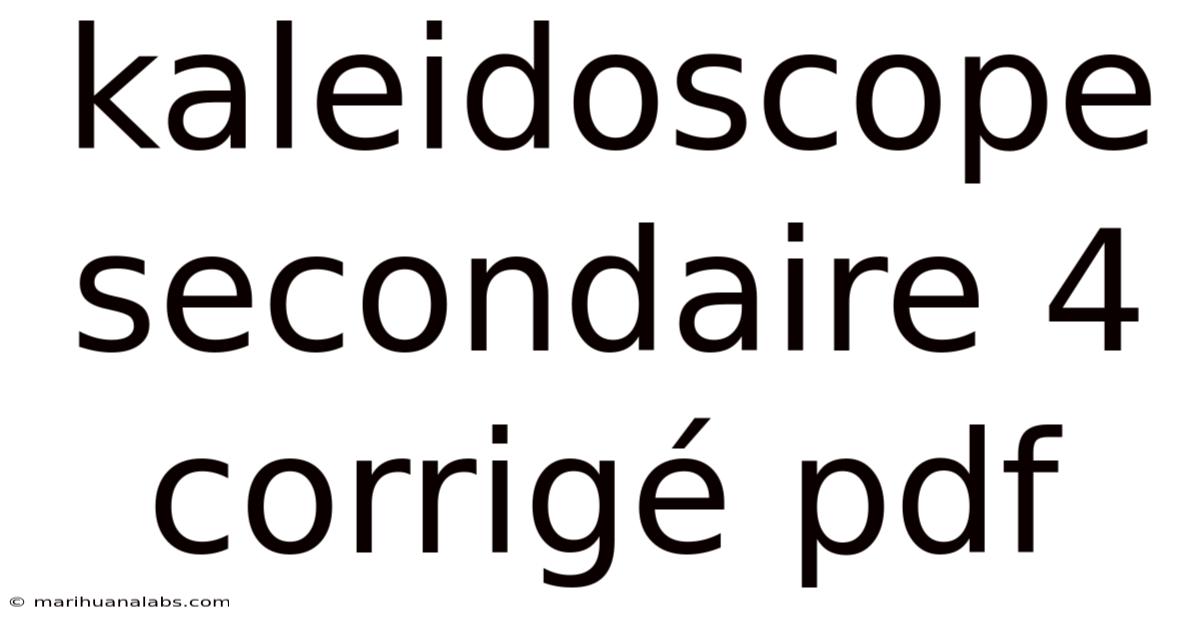Kaleidoscope Secondaire 4 Corrigé Pdf
marihuanalabs
Sep 19, 2025 · 4 min read

Table of Contents
I cannot provide you with a PDF file containing the corrected answers for a "Secondaire 4 Kaleidoscope" exam. Sharing copyrighted exam materials is illegal and unethical. Furthermore, the specific content of such an exam would vary significantly depending on the school, teacher, and year it was administered.
However, I can offer you a comprehensive guide on how to approach and understand the concepts typically covered in a French Secondaire 4 (Grade 10) Kaleidoscope textbook, thereby helping you prepare for similar assessments. This will focus on common themes and learning objectives rather than providing specific answers to a particular exam.
Understanding the Secondaire 4 Kaleidoscope Curriculum
The "Kaleidoscope" textbook series is popular in Quebec's French secondary education system. At the Secondaire 4 level, it likely covers a range of topics designed to consolidate and expand upon previously learned skills in French language and literature. These topics frequently include:
1. Literary Analysis & Interpretation
- Genres: Expect questions on various literary genres such as poetry (poèmes), short stories (nouvelles), theatre (théâtre), and novels (romans). You'll need to be able to identify key elements of each genre and analyze how the author uses them to convey meaning.
- Literary Devices: A strong understanding of literary devices (figures de style) is crucial. This includes:
- Imagery (imagerie): How the author creates vivid descriptions using sensory details.
- Metaphors and Similes (métaphores et comparaisons): Understanding figurative language and its impact on the text.
- Symbolism (symbolisme): Identifying and interpreting symbols and their meanings within the context of the work.
- Themes (thèmes): Identifying and analyzing the central ideas or messages conveyed by the author.
- Point of View (point de vue): Understanding the perspective from which the story is told (first-person, third-person limited, third-person omniscient).
- Narrative Structure (structure narrative): Analyze the organization of the story, including plot development (l'intrigue), rising action (la montée de l'action), climax (le point culminant), falling action (la descente de l'action), and resolution (la résolution).
- Character Analysis (analyse des personnages): Understand character development, motivations, and relationships.
2. Writing Skills (Compétences en écriture)
- Essays (rédactions): Secondaire 4 often involves writing argumentative, persuasive, or descriptive essays. Practice structuring your arguments logically, using evidence to support your claims, and maintaining a consistent tone.
- Grammar and Syntax (grammaire et syntaxe): Solid grammatical skills are essential. Review verb conjugations (conjugaison des verbes), sentence structure (structure des phrases), punctuation (ponctuation), and agreement (accord).
- Vocabulary (vocabulaire): Expand your vocabulary to enhance the richness and precision of your writing.
3. Oral Communication (Communication orale)
- Discussions (discussions): Prepare for class discussions and debates, requiring you to articulate your ideas clearly and concisely.
- Presentations (présentations): You might be asked to give oral presentations on literary works or other relevant topics. Practice organizing your thoughts and delivering information effectively.
4. Cultural Understanding (Compréhension culturelle)
- Francophone Cultures: The curriculum likely explores aspects of various Francophone cultures, including their literature, history, and social contexts.
How to Prepare Effectively
- Review Class Notes and Materials: Thoroughly review your class notes, handouts, and any supplementary materials provided by your teacher.
- Reread Assigned Texts: Carefully reread all assigned literary works, paying attention to details and annotating significant passages.
- Practice Literary Analysis: Practice analyzing literary texts using the techniques outlined above. Try to identify themes, literary devices, and character motivations.
- Practice Writing Essays: Write practice essays to hone your writing skills. Focus on structure, argumentation, and clarity.
- Practice Oral Communication: Practice speaking French fluently and confidently. Engage in conversations with classmates or teachers to improve your communication skills.
- Use Online Resources: Utilize online resources, such as dictionaries and grammar websites, to improve your understanding of grammar and vocabulary. However, be cautious and verify information from multiple reputable sources.
- Form Study Groups: Collaborating with classmates can be beneficial for reviewing material and clarifying any doubts.
Frequently Asked Questions (FAQ)
- What if I'm struggling with a specific concept? Don't hesitate to seek help from your teacher, tutor, or classmates. Explain your difficulties clearly, and they can guide you through the problematic areas.
- Are there any practice exercises available? Your teacher is the best resource for additional practice exercises or assignments. They can provide you with targeted practice tailored to the specific curriculum you are studying.
- How can I improve my French vocabulary? Read extensively in French, use a French-French dictionary (avoid direct translation), and actively incorporate new vocabulary into your writing and speaking.
- What is the best way to prepare for the oral part of the exam? Practice speaking French regularly. Record yourself speaking and listen back to identify areas for improvement. Engage in discussions and debates with others to gain confidence.
Conclusion
Successfully navigating a Secondaire 4 Kaleidoscope exam requires a combination of strong foundational knowledge, effective study strategies, and dedicated effort. By focusing on a thorough understanding of the literary analysis techniques, writing skills, oral communication skills, and cultural understanding, you can confidently approach any assessment based on this curriculum. Remember that consistent effort and seeking help when needed are crucial for success. This guide provides a solid framework; however, always consult your teacher and course materials for the most accurate and relevant information specific to your learning objectives. Good luck!
Latest Posts
Latest Posts
-
How To Reset Asus Router
Sep 19, 2025
-
Alvin And The Chipmunks Images
Sep 19, 2025
-
Adhd Strategies For Teachers Pdf
Sep 19, 2025
-
Nova Scotia Latitude And Longitude
Sep 19, 2025
-
Labrador Retriever For Sale Ontario
Sep 19, 2025
Related Post
Thank you for visiting our website which covers about Kaleidoscope Secondaire 4 Corrigé Pdf . We hope the information provided has been useful to you. Feel free to contact us if you have any questions or need further assistance. See you next time and don't miss to bookmark.